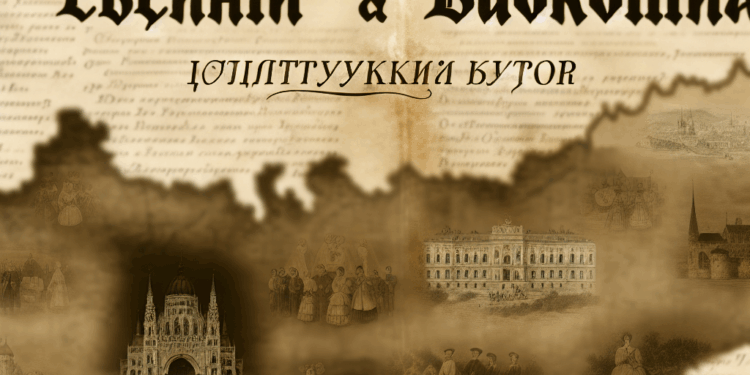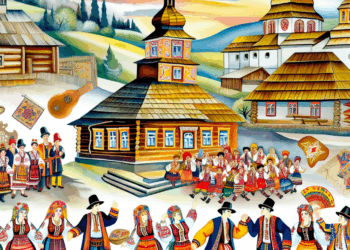Introduction
Bukovyna, a region located on the border between Ukraine and Romania, is famous for its multicultural history and significant figures who have contributed greatly to its development. One such prominent figure is Mykhailo Kozachynsky (1886-1941), a Ukrainian poet, writer, public figure and chairman of the local council. In this article we will look at his life, achievements and influence on Bukovyna and its cultural traditions.
Early years and education
Mikhail Kozachinsky was born on 21 July 1886 in the village of Tarasevtsy, which now belongs to the Chernivtsi region. His family was artistically gifted, which contributed to the formation of his creative abilities from an early age. Kozachinsky studied at the gymnasium in Chernivtsi, where he began to engage in literature and actively participate in the cultural life of the region.
After graduating from the gymnasium, Mikhail continued his education at the Philological Faculty of Chernivtsi University. Studying at the university became an important stage in his life, as it gave him the opportunity to communicate with like-minded people and support the Ukrainian cultural movement.
Literary activity
Kozachynsky began writing poetry and prose when he was only 18 years old. His first publications appeared in Ukrainian literary journals such as Literaturno-naukovyi visnik and Zhitya i slovo. Kozachinsky’s poems stood out for their patriotic themes, romantic style and deep reflections on the fate of Ukraine and its people.
One of his most famous works is the collection of poems “On Buryaki”. In this collection Kozachinsky, inspired by nature and the life of ordinary people, creates vivid images of Ukrainian life and national spirit. His work deeply touched the hearts of readers and contributed to the formation of Ukrainian cultural identity in Bukovyna.
Public activities and politics
Kozachynsky did not limit himself to literary activities. In the early 1920s, he became an active participant in the general Ukrainian movement seeking to strengthen Ukrainian identity in the multi-ethnic region. During this period, he held a number of positions in local government, including chairman of the Bukovina Council.
During his chairmanship, Kozachynsky initiated many social and cultural projects aimed at supporting the Ukrainian language, culture and education. He actively promoted the interests of Ukrainians in a multi-ethnic environment, trying to create an atmosphere that fostered mutual understanding and respect between different ethnic groups in Bukovyna.
Impact on culture and education
Mykhailo Kozachynsky made a significant contribution to the development of Ukrainian culture in Bukovyna. He was one of the founders of the Public Ukrainian Theatre in Chernivtsi, which became a venue for theatre productions and other cultural events. Thanks to his efforts, the theatre gained popularity and became an important part of the cultural life of the region.
Kozachynsky also supported initiatives to establish Ukrainian schools and libraries, which contributed to the development of Ukrainian education in the region. He realised that knowledge and education were key to strengthening Ukrainian identity among the local population.
The context of the era
Mykhailo Kozachynskyi’s work came during a difficult period in Bukovyna’s history, when the region was under the control of various states, including Austria-Hungary, Romania and the Soviet Union. These political changes significantly affected the cultural and linguistic identity of the population.
While national minorities sought to preserve their identity, Ukrainians in Bukovina began to form their own cultural movement. Activists such as Kozachynsky became important figures in this process. They fought for the rights and interests of the Ukrainian people in the face of the political pressure exerted by the power structures.
Last years of life and legacy
Unfortunately, the last years of Mykhailo Kozachynskyi’s life were marked by political repression. With the advent of Soviet Union rule, many cultural and social activists, including Kozachinsky, were threatened with persecution. In 1941, shortly after the outbreak of the Great Patriotic War, Mikhail Kozachinsky was arrested. His fate remains little known, and many facts about his life remain a mystery.
Nevertheless, Mikhail Kozachinsky’s legacy lives on. His literary works and activities remain a symbol of the struggle for Ukrainian identity in Bukovyna. His inspiration and energy for the development of the cultural life of the region remain relevant to this day.
Conclusion
Mykhailo Kozachynsky is not just an outstanding personality of Bukovyna; he is a symbol of the struggle for Ukrainian culture and identity in difficult historical times. His literary works and public activities had a significant impact on the formation of Ukrainian society in Bukovyna and on the development of the cultural movement as a whole.
Today, as Bukovyna is once again undergoing a period of renewal of its cultural identity, his legacy serves as an important reminder of the need to protect and value one’s roots, traditions and language. Mihail Kozaczynski remains an inspiration for future generations striving to preserve the uniqueness and diversity of the cultural heritage of this unique region.








